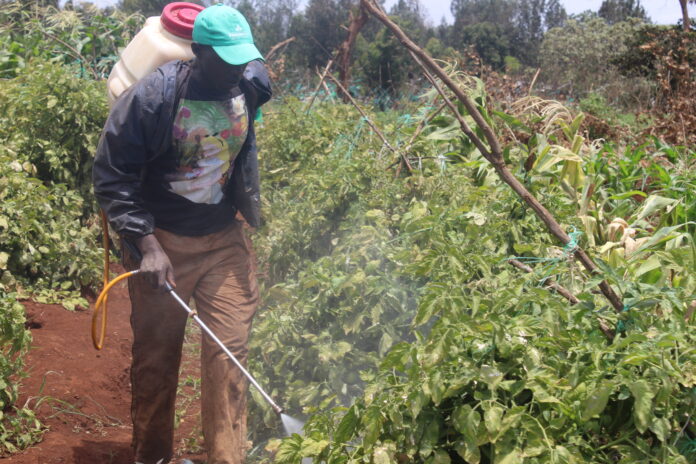PART 2
By Mary Mwendwa and Christian Locka
Farmers in Kenya and Cameroon are using chemical pesticides containing molecules that are considered harmful and dangerous to human health and the environment. These pesticide molecules have been banned in the European Union markets hence raising concerns about why they are still widely used by farmers and supplied by agrochemical giants.
“Kenya and Cameroon have regulations on highly hazardous pesticides (HHP) used by farmers, in addition to international consumer and environmental protection laws including FAO guidelines. This collaborative investigation reveals how and why these laws are often sidelined to protect certain economic interests.”
Pesticides Regulation
22-year-old Stanley Katua hails from Machungwani farm in Taita-Taveta County and uses some of the pesticides that are deemed to be dangerous and banned within the European Union. He has no idea about the toxic nature of pesticides and any law that governs their usage.
Katua is employed as a farm worker where he sprays crops without any protective gear.
“I do get skin and eye irritations after I spray crops, but I have no extra money to buy protective gear and also my boss cannot buy them for me. That would be an extra cost to him.”
Similar cases of farmers not using protective gear were witnessed during this investigation in Kirinyaga County in Kenya’s central part.
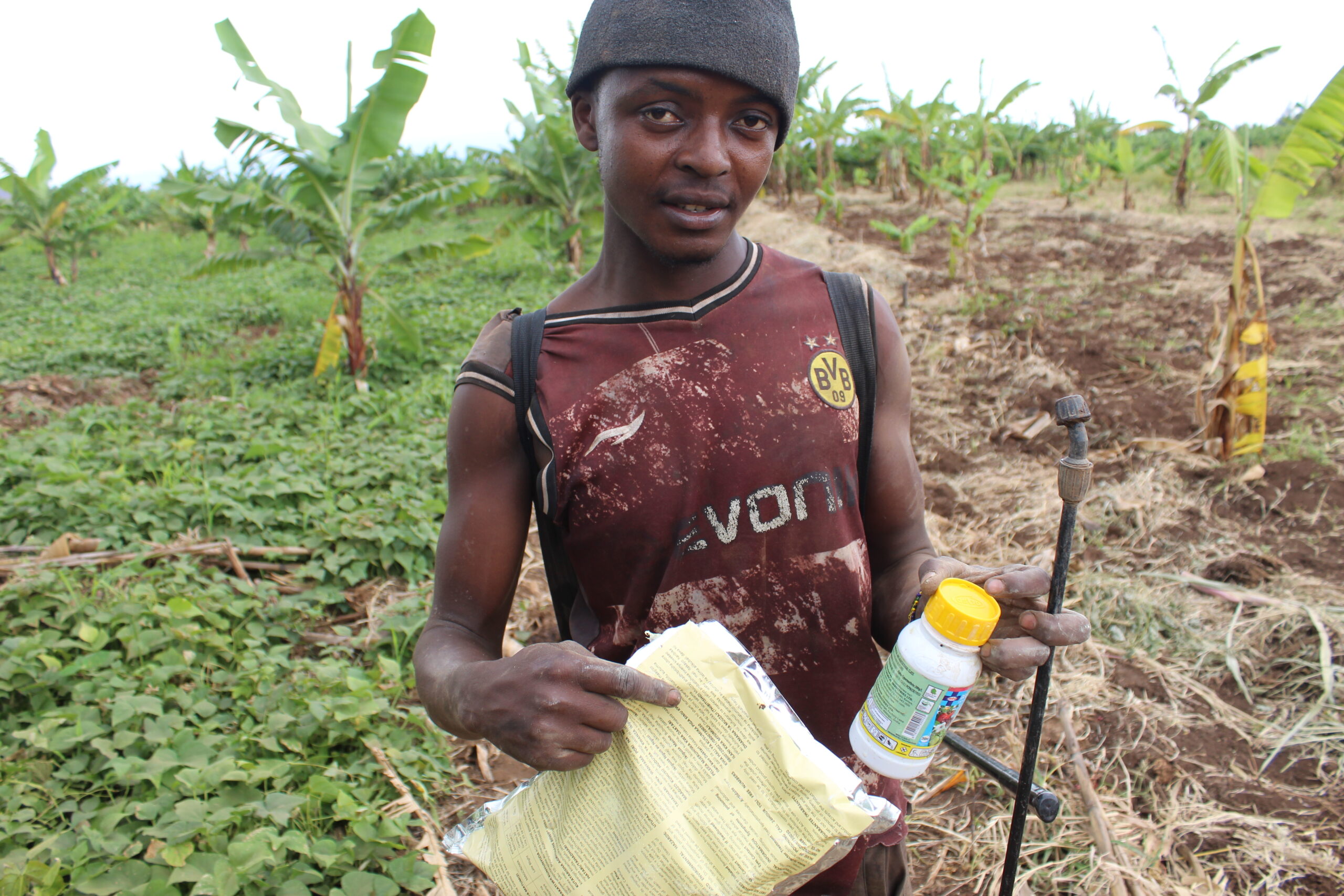
Anne Njambi a mother of three confirms how she uses pesticides on her vegetables, “I just know these chemicals will kill pests, I do not know anything else beyond that. When spraying I get affected, and my skin itches even the eyes. But, we are used to this, we cannot afford protective clothes.” Says Njambi.
Njambi confides that she occasionally attends farmer’s training. Asked if they ever mention regulation on using pesticides, she says she has never heard of such a thing. She is even shocked there is an Act that exists.
“I have never heard of any law around the usage of pesticides, and if it is there then no one makes an effort to let us know about it.” Wonders Njambi.
Njambi and Katua are not aware that there are local and international regulations that are supposed to guide and protect them against the use of hazardous pesticides that can harm their health and the environment.
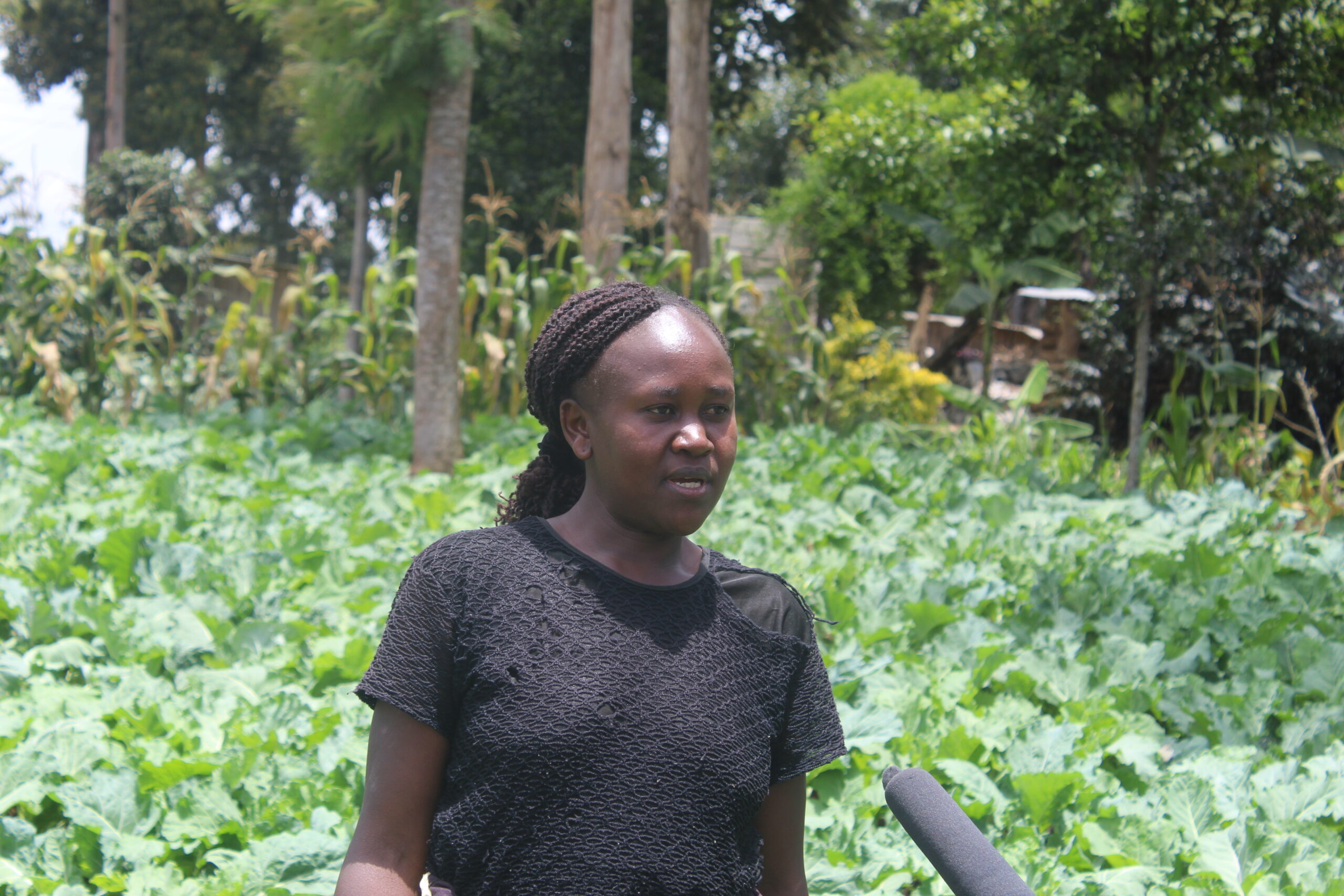
According to the Pesticides Control Products Board (PCPB) they have approved at least 32 molecules that they say are fit for use by farmers.
However, Dr. Paul Ngaruiya, Head of Research Strategy and Planning at PCPB confirms how they are doing analysis of pesticide products in their laboratories.
He confirms that they have not been able to carry out studies on organisms to determine the level of pesticide residues.
These critical studies need to be done to help them make science-backed decisions to help farmers and Kenyans at large with what kind of pesticides to use.
“Such an exercise is very expensive and we lack enough resources to conduct them. Though we partner with donors we hope one day we will be able to achieve this.” Dr. Ngaruiya says.
UN Food and Agriculture Organization (FAO) data from 2020 puts South Africa as the leading Country in pesticide use with 26, 875 tonnes, followed by Egypt with 11, 352 tonnes, then Cameroon with 7,322 tonnes, and Ethiopia in East Africa recorded 4,128 tonnes respectively.
The same report showed that Kenya’s pesticide imports increased from 6,400 tonnes in 2015 to 15,000 tonnes in 2018.
The Pesticides Control Act of 1983 is one of the legislation on the use of pesticides in Kenya. The Act allowed the creation of a Pest Control Products Board (PCPB) whose functions include: Assessing pest control products in line with the Act and regulations, recommending the registration of pest control products, and advising the Agriculture ministry on the enforcement of the Act and regulations. There are also many other laws related to pesticides.
Emmanuel Atamba, the program coordinator of Route to Food Initiative, confirms how they started working on the issue of pesticides three years ago. “Through research and data that is available, we have noted that most of the products come from the EU and therefore we have raised concerns.”
“We see this as a double standard because on the one hand, the EU has taken measures to safeguard their environment and consumers and at the same time allowing the same products to be exported to some Countries like Kenya. We find this very disturbing.” Atamba says.
Atamba adds that they are yet to see responsibility from governments in terms of having the power and mandate through PCPB which is supposed to review some products.
“It is upon us to deal with the pesticides of concern with the same attention it requires,” he added.
Atamba views that not all crops grown in Kenya need pesticides, but farmers are tuned into the culture. They even buy them before planting season.
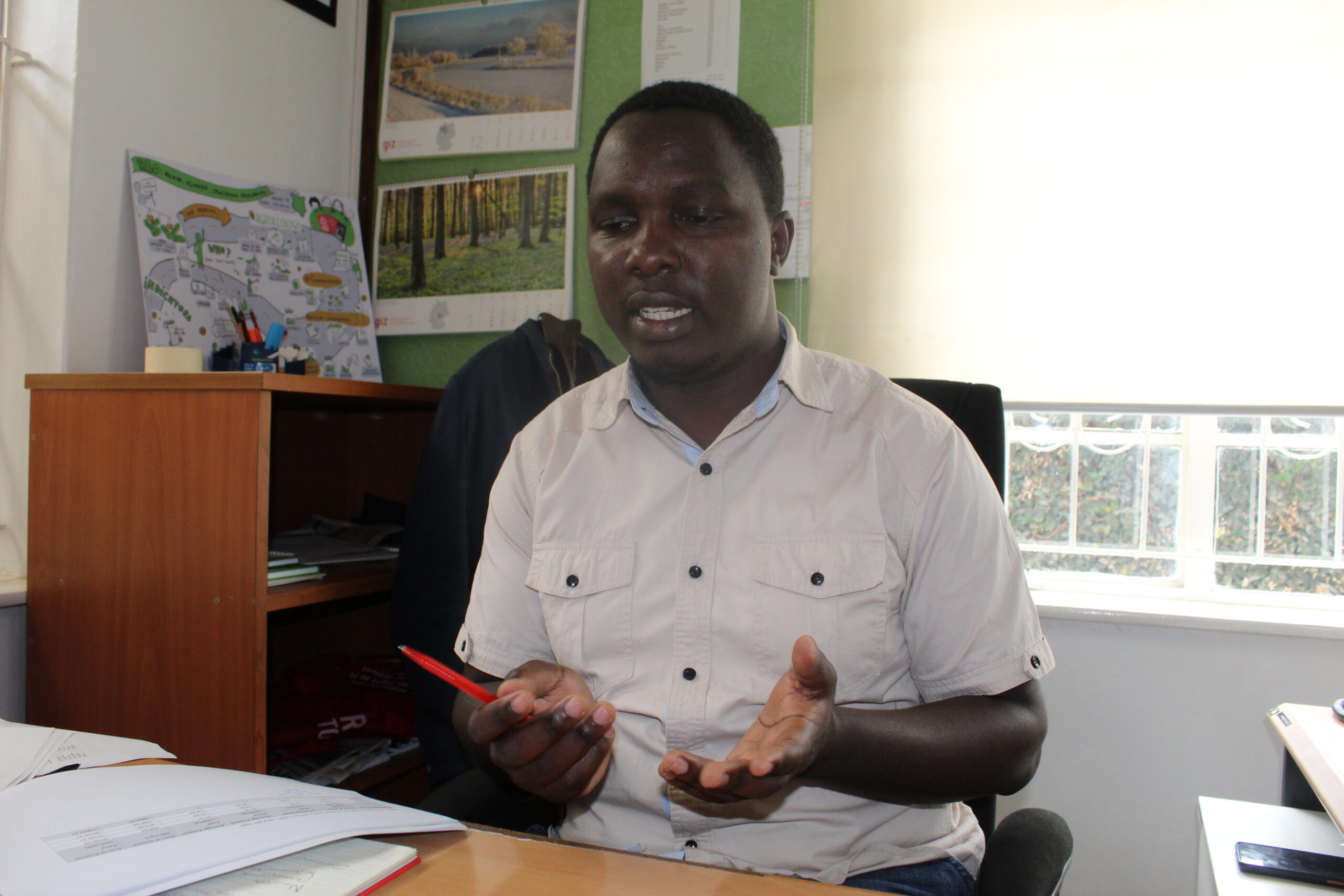
The International International Code of Conduct on Pesticide Management provides standards for government regulators and the private sector on best practices in managing pesticides. The code which was approved by the FAO conference in 2013 is supposed to be a reference point for the pesticide Industry.
Similarly, the code is set to address the need for collaborative efforts between governments and pesticide exporting and importing companies to minimize potential environmental and health risks associated with pesticides.
The EU Pesticide Regulation(EC 1107/2009) is one of the toughest laws on pesticides in the world. With this kind of regulation, many of the banned pesticides produced by European Countries continue to sell them to Countries like Kenya and Cameroon.
In 2018 alone, more than 81,000 tonnes of 41 dangerous pesticides, banned for agricultural use in the EU, were exported by European companies. A legal opinion from the Centre for International Environmental Law, a non-governmental organization, states that European exports of banned pesticides to Africa and Central America violate international treaties and human rights.
The European Commission had earlier promised to implement a ban on the export of banned pesticides in the EU by 2023. However, this item was unexpectedly withdrawn from the agenda. This has raised eyebrows on whether the EU Commission still wants to remain committed to this issue despite the pressure from chemical companies.
The French Greens/EAFA MEP Michèle Rivasi is deeply concerned by the decision. She is the co-author of an open letter signed in 2020 by nearly 80 MEPs from across the political spectrum to call on the Commission to ban the export of these toxic products from the EU. “The Commission made a commitment and is doing nothing. In the end, it is the chemical lobby that wins and continues to profit from this shameful practice,” she said.
Michèle Rivasi frequently calls on the European Commission to take quick action on this issue. The Commissioner for the Environment must propose measures as soon as possible and the Commissioner in charge of international partnerships. But now investigations and testimonies are accumulating so that the issue can no longer be denied.
In Cameroon, the Ministry of Agriculture and Rural Development has taken several decisions to ban the use of certain pesticides in the past years. However, this move towards better regulation contradicts the government’s acceptance of dangerous pesticides. European exporters we have talked to say they export dangerous pesticides with the “consent” of the importing countries.
The pesticides are defined as quarantine organisms, also called harmful organisms, according to the provisions of Decree No. 2005/0771/PM of 6 April 2005 to lay down the modalities for the execution of plant quarantine operations. Any person wishing to bring these organisms into the national territory needs mainly two documents.
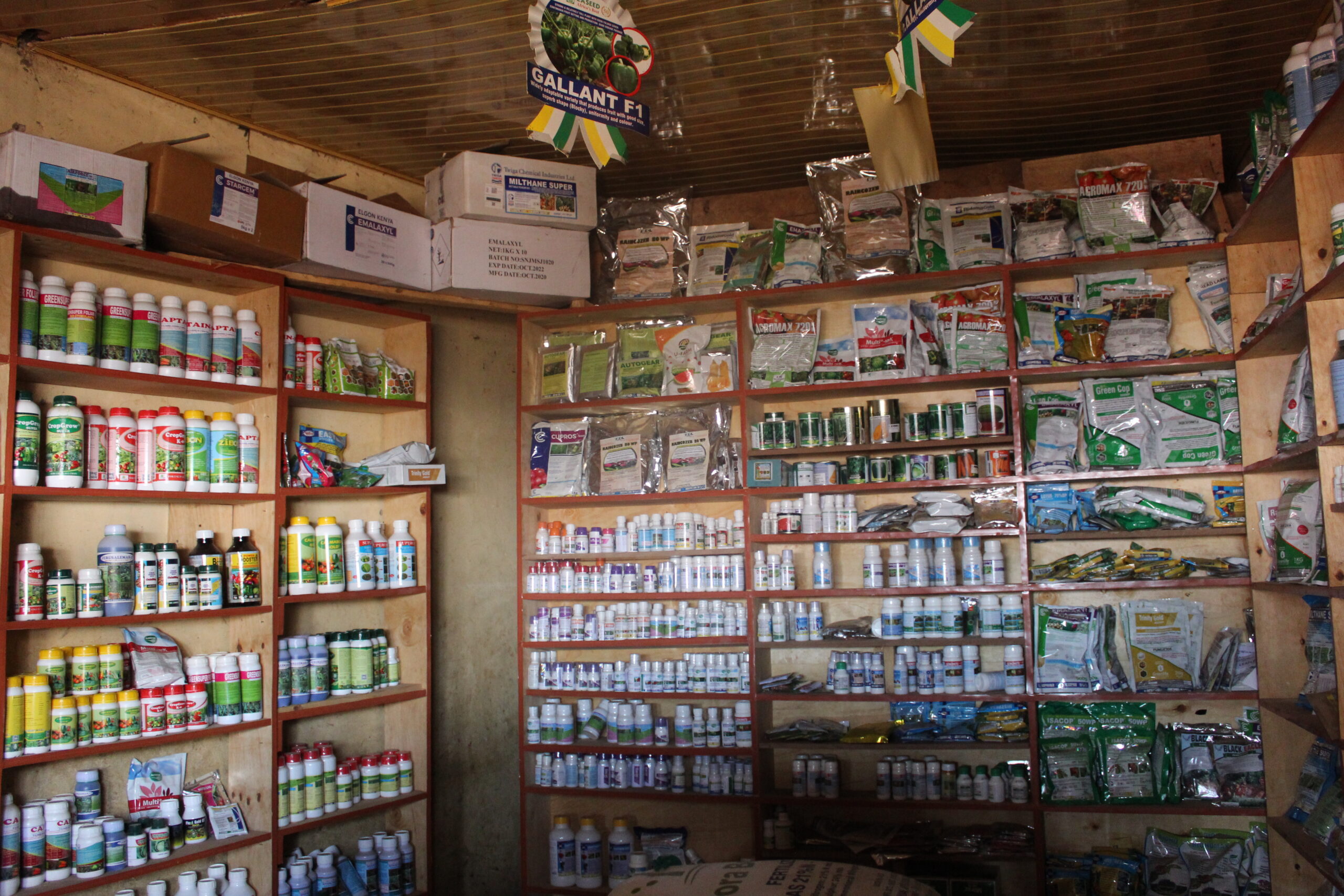
“On import, regulated articles at high risk of introduction of quarantine organisms are accompanied by a phytosanitary certificate respecting the requirements of the relevant import permit“, stipulates article 8 of the decree.
Alain Frejus Ngompe is a journalist who has written several articles on the environment. He has recently published a compendium of environmental laws in Cameroon to facilitate access to legislation concerning this sector, he says.
We asked him why the public authorities accept to take products declared dangerous elsewhere.
“The bodies responsible for repressing or registering pesticides are not working at full capacity,” said Ngompe.
“There is also a lack of coordination between these bodies”, he added. “In the control of pesticides, the ministry in charge of agriculture does not consult the ministry of environment before taking a decision that concerns both institutions. That is why there is this double talk”.
The Ministry of Agriculture and Rural Development contacted in the framework of this investigation to comment on the registration of dangerous pesticides in Cameroon did not react to our request for information.
This article was developed with the support of Journalismfund.eu. You can read PART 1 of this pesticide investigation here.

